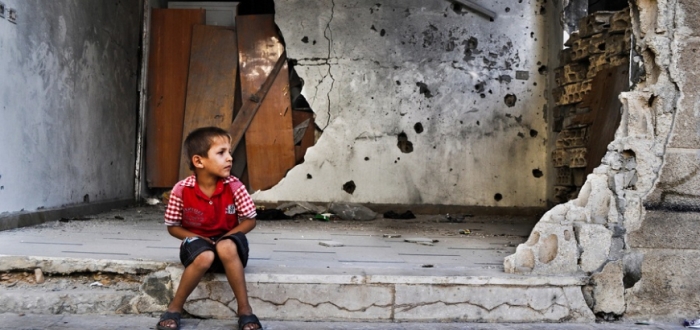More than 13 million Syrian refugees and displaced people inside the country have fled their homes and sought refuge due to the five-year conflict in Syria, a U.K.-based rights monitor has revealed.
The Syrian Network for Human Rights reported on Monday, as a summary for World Refugee Day, the total number of Syrian citizens who are refugees “reached no fewer than 5.835 million refugees, with children comprising over 50 percent, while the number of women is 35 percent and 15 percent are men.”
It said that: “A very large portion of the refugees are not registered with the [United Nations] High Commissioner for Refugees, and so they are not included in their statistics. This is because many of them arrived through [illegal] routes and paths and smuggling over the border, out of fear they would not be received,” adding that another unknown number completed their reception in countries of refuge through relatives.
The network went on to describe the distribution of Syrian refugees in the neighboring countries, with Turkey occupying the top position with no fewer than 1.9 million refugees, including about 450,000 children, and no fewer than 270,000 women. The rate of flight to Turkey has increased in the past months because of the continuing clashes in the northern areas of Syria, with about 62 percent of those without identity papers, i.e., about 1.1 million Syrians.
Turkey has previously announced among its official numbers that various provinces of the country have received more than 2.7 million Syrians.
The Syrian Network for Human Rights said in its statement that “Lebanon comes in second place among the neighboring countries in receiving refugees, with the number reaching no fewer than 1.7 million refugees, among them about 570,000 children, and no fewer than 190,000 women.” About 27 percent of refugees inside Lebanon are without identity papers (459,000 people), according to the Network.
Following Lebanon was Jordan, hosting at least 1.4 million refugees, including about 350,000 children and at least 175,000 women, about 36 percent without identity papers (490,000 people).
Iraq hosts at least 525,000 refugees and Egypt at least 270,000 refugees, while the countries of the Arab Maghreb (Libya, Algeria and Morocco) host about 40,000 Syrian refugees.
With regards to Syria’s internally displaced (those forced to leave their homes and flee to other areas inside Syria), the Network noted that “the main reason for the displacement is the massive destruction of buildings, which includes homes, workplaces, markets, shops and medical clinics.”
It said that “the number of displaced people has reached about 7.475 million, distributed according to Syrian provinces. In the Damascus countryside there are about 2.3 million displaced people, and in Aleppo about 1.8 million. In Homs there are about 1.1 million displaced people, while in Deir-ez-Zor there are about 640,000, and in Hama about 370,000. Meanwhile, about 325,000 have been displaced to Lattakia and 250,000 to Daraa, 230,000 to Raqqa, and 180,000 to Idleb, and about 160,000 to Damascus, and about 120,000 to Hassakeh.”
The Network said that “most displaced people prefer quiet areas controlled by the regime like the provinces of Tartous and Lattakia, and some districts of Damascus, while a large portion of the displaced prefer to remain in areas under opposition control, and reside in towns and areas along the border between Turkey and Syria because it is well-protected from bombardment.”
It said that “most of the displaced people are in need of different urgent humanitarian aid, but prominently about 60 percent (around 4.5 million) are in need of food aid, which constitutes a real danger. The number of Palestinian refugees inside Syria is about 570,000, with about 60 percent of them displaced inside Syria.”
It added that: “Major displacement has occurred from the areas that the ISIS organization controls, such as the provinces of Deir-ez-Zor and Raqqa, and some through forced expulsion along ethnic or sectarian lines.” The Kurdish Democratic Union Party, classified as a terrorist group in Turkey, has meanwhile carried out “forced displacement, some of which bore an ethnic character, against a number of villages and areas in Hassakeh province”.
This article was translated and edited by The Syrian Observer. Responsibility for the information and views set out in this article lies entirely with the author.


